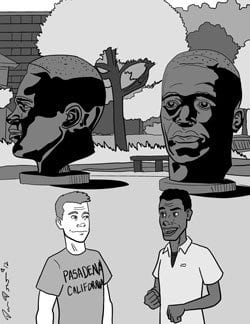
The winning obsession
Editor’s note: Pasadena unveiled statues of Mack and Jackie Robinson in 1997 in honor of their athletic achievements. Mack came in second to Jesse Owens in the 1936 Berlin Olympics and Jackie became the first black player in major league baseball. |
Every four years the Summer Olympic Games inspire an increase in competitive spirit around the world. Citizens of different nations root ardently for their athletic teams to win. Even before the games begin, Americans are already motivated by an insatiable desire to win. Winning seems to be part of the national culture.
A willingness to compete has produced much of America’s economic and academic success. However, excessive emphasis on being number one has induced some people to ignore high moral standards in reaching for first place. It also causes us to ignore the poignant stories of those who reached for the brass ring but fell just short of the goal.
Everyone at all familiar with Olympic lore knows the story of Jesse Owens. Owens won four gold medals in the 1936 Olympics in Berlin and boldly repudiated Adolph Hitler’s assertion of the superiority of the Aryan master race. Deservedly, Owens received the adulation of the world; but in second place in the 200 meter race was another African American, Matthew (Mack) Robinson of Pasadena.
In many ways, Robinson’s achievement was even more athletically prodigious than Owens’ victory. As a student at Pasadena Junior College, Robinson had no coach, he had to raise funds to travel to New York for the trials, and he broke the Olympic record when he won the silver medal while running in tattered track shoes he had worn since high school. Owens was already an endowed Ohio State University star, which status by no means diminishes the magnitude of his achievement.
According to a New York Times story, Robinson’s success in Berlin was hardly noted when he returned to Pasadena, Calif. Martinus Osendarp of the Netherlands, who won the bronze, had a different experience on his return home. He was honored as a hero and called by a sportscaster the “best sprinter of the white race.” He became a police officer and was given the opportunity to continue his career in track.
Robinson had to struggle to find meaningful employment. He finally found a career helping young boys to abide by the law and seek useful opportunities. Even then he would have ultimately been ignored if it were not for the fame of his younger brother, Jackie Robinson, who broke the color barrier in baseball in 1947.
Finally in 1997, Pasadena unveiled across from city hall nine-foot high bronze statues of the heads of the Robinson brothers. This was 61 years after Robinson won an Olympic silver medal. In the words of Mack Robinson, “It’s not too bad to be second best in the world at what you’re doing, no matter what it is. It means that only one other person in the world was better than you.”
An obsession with being “number one” can cause Americans to ignore great stories of achievement, like that of Mack Robinson. Or even worse than that, the obsession to win can induce some people to tolerate the abuse and violation of others as did the leaders of the football program at Penn State.






